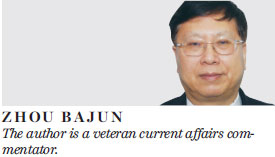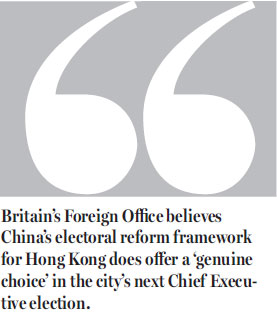Britain adopts pragmatic policy toward Hong Kong
Updated: 2015-01-21 09:22
By Zhou Bajun(HK Edition)
|
|||||||||
On Jan 8, the British Foreign Office Minister of State Hugo Swire, who has just visited Beijing, met Hong Kong lawmakers including some from the opposition camp. He advised them to support the mechanism put forward by the Hong Kong government for implementing the election of the Chief Executive (CE) by universal suffrage in 2017.
On Jan 13, shortly after returning to London, Swire attended a hearing at the British Parliament's Foreign Affairs Committee as part of an inquiry into post-handover affairs in Hong Kong. He said, "Britain's Foreign Office believes China's electoral reform framework for Hong Kong does offer a 'genuine choice' in the city's next Chief Executive election." He urged members of Hong Kong's Legislative Council to support it. He said: "What we are saying is we want a package, to the benefit of all people of Hong Kong, to be endorsed because we very much want to see this road to a purer form of democracy undertaken by 2017 and then ultimately in 2020." Swire added, "It's better than nothing'."
What the British Foreign Office minister said is almost the same as senior officials in the Hong Kong government in charge of the SAR's constitutional development. Has London changed its views on political reform in Hong Kong?
More than a year ago, on Sep 14, 2013, the same British Foreign Office Minister of State Hugo Swire published an article in Ming Pao, one of Hong Kong's Chinese-language newspapers. It argued that "elections in 2017 must provide genuine choice". Swire said: "The important thing is that the people of Hong Kong have a genuine choice to enable them to feel they have a real stake in the outcome," and "Britain stands ready to support in any way we can". Swire's article at the time was applauded by Hong Kong's opposition camp. But his latest comments on the same issue received a negative response from the opposition.
London has adjusted its policy on Hong Kong's constitutional development, from trying its best to support the opposition camp seeking "genuine universal suffrage" to advising them to accept a compromise which is "better than nothing". This policy adjustment doesn't mean London has changed Britain's strategy toward Hong Kong, that is: to maintain sound relationships with China and to preserve British interests and influence in Hong Kong.
London never misses an opportunity to expand Britain's interests in Hong Kong. This is why Hugo Swire and the city's British consulate-general supported the opposition's struggle for "genuine universal suffrage". Beijing strongly rejected any foreign forces meddling in China's internal affairs - including Hong Kong issues. Therefore, London has gradually modified its comments about Hong Kong since late 2013.
On Sept 4, 2014, the British Foreign Office issued a statement on the decision by China's Standing Committee of the National People's Congress (NPCSC) on Aug 31. Though the Foreign Office said: "We recognize that the detailed terms that the National People's Congress has set for the 2017 election will disappoint those who are arguing for a more open nomination process", the statement said: "We welcome the confirmation that China's objective is for the election of Hong Kong's Chief Executive through universal suffrage."
More than two months on, China prevented members of Britain Parliament's Foreign Affairs Committee from visiting Hong Kong. The Foreign Office's junior minister Hugo Swire told the British lawmakers: "We need to understand each other cultures and respect each other."
London clearly wants to strengthen Sino-British relationships. On Jan 13, Swire announced in the British Parliament that President Xi Jinping would travel to Britain on a state visit later this year. This would reflect closer economic relations between China and Britain even though political tensions still persist. Swire also responded to British lawmakers' accusations that London was too concerned about safeguarding its own business interests at the expense of democracy in Hong Kong. He said the British government was concerned about the independence of the judiciary and freedom of the press in Hong Kong.
In Hong Kong, some opposition politicians criticized the British government for supporting the current electoral reform proposals. This is for the purpose of strengthening economic ties between London and Beijing. The leader of the Civic Party has asked Hong Kong people to fight for "genuine universal suffrage" themselves rather than depending on support from London.
The "Love the Nation and Love Hong Kong" camp should consistently oppose any foreign interference in Hong Kong issues. Meanwhile, Hong Kong people should encourage more opposition lawmakers to take a pragmatic approach by voting for universal suffrage in the 2017 CE election.


(HK Edition 01/21/2015 page9)